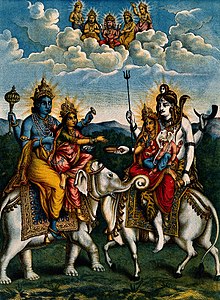Our website is made possible by displaying online advertisements to our visitors.
Please consider supporting us by disabling your ad blocker.
Ishvara

| Part of a series on |
| Hinduism |
|---|
 |
Ishvara (Sanskrit: ईश्वर, romanized: Īśvara) is a concept in Hinduism, with a wide range of meanings that depend on the era and the school of Hinduism.[1][2] In ancient texts of Hindu philosophy, depending on the context, Ishvara can mean supreme Self, ruler, lord, king, queen or husband.[1] In medieval era Hindu texts, depending on the school of Hinduism, Ishvara means God, Supreme Being, personal God, or special Self.[2][3][4] In Shaivism, Ishvara is an epithet of Shiva.[5][6][7][8] In Vaishnavism it is synonymous with Vishnu, like in his epithet of Venkateswara.[9] In traditional Bhakti movements, Ishvara is one or more deities of an individual's preference (Iṣṭa-devatā) from Hinduism's polytheistic canon of deities. In modern-day sectarian movements such as Arya Samaj and Brahmoism, Ishvara takes the form of a monotheistic God.[10] In the Yoga school of Hinduism, it is any "personal deity" or "spiritual inspiration".[11] In Advaita Vedanta, Ishvara is the manifested form of Brahman.[12]
- ^ a b Monier Monier Williams, Sanskrit-English dictionary, Search for Izvara Archived 4 August 2019 at the Wayback Machine, University of Cologne, Germany
- ^ a b Cite error: The named reference
riepewas invoked but never defined (see the help page). - ^ Cite error: The named reference
ianwwas invoked but never defined (see the help page). - ^ Cite error: The named reference
mirceaelaide73was invoked but never defined (see the help page). - ^ "Monier-Williams Sanskrit-English Dictionary". IITS Koeln. p. 171. Archived from the original on 9 March 2023. Retrieved 13 January 2021.
- ^ James Lochtefeld, "Ishvara", The Illustrated Encyclopedia of Hinduism, Vol. 1: A–M, Rosen Publishing. ISBN 0-8239-2287-1, page 306
- ^ Laurie Searl, ed. (2014). Lord Śiva's Song: the Īśvara Gītā. Translated by Andrew J. Nicholson. ISBN 978-1-4384-5102-2. OCLC 880450730.
- ^ Roshen Dalal (2010). Hinduism: An Alphabetical Guide. Penguin Books. pp. 235, 379–380. ISBN 978-0-14-341421-6.
- ^ Cite error: The named reference
olileawas invoked but never defined (see the help page). - ^ RK Pruthi (2004), Arya Samaj and Indian Civilization, ISBN 978-81-7141-780-3, pages 5–6, 48–49
- ^ Cite error: The named reference
lpflwas invoked but never defined (see the help page). - ^ Bahm, Archie J. (1992). The World's Living Religions. Jain Publishing Company. ISBN 978-0-87573-000-4.
Previous Page Next Page


